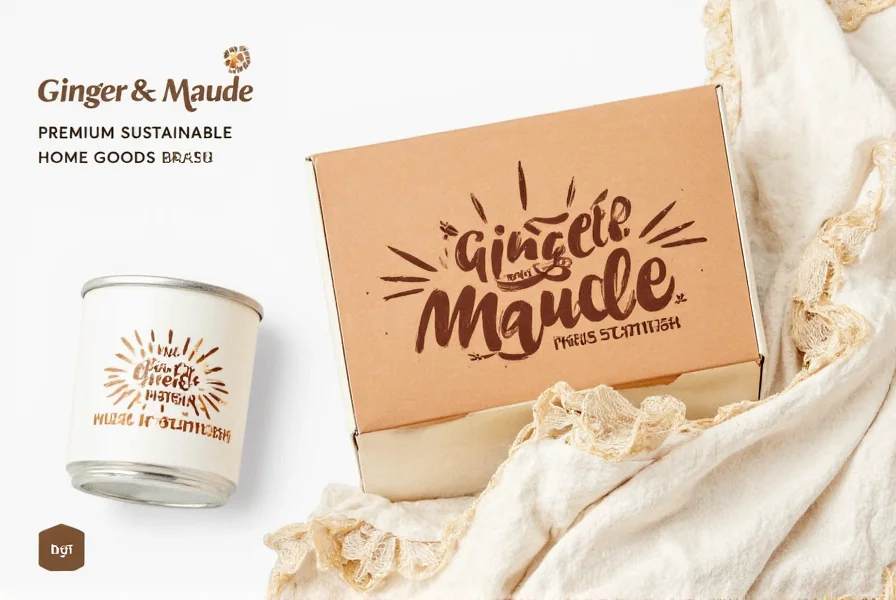Ginger and Maude has established itself as a distinctive player in the sustainable home goods market through its dedication to quality craftsmanship and ethical production practices. The brand's philosophy centers on creating timeless pieces that blend functionality with aesthetic appeal, appealing to consumers seeking both luxury and responsibility in their home textiles.
Brand Origins and Philosophy
Founded in the early 2010s, Ginger and Maude emerged during a growing consumer movement toward mindful consumption. The brand's name reflects a blend of traditional and contemporary influences—"Ginger" suggesting warmth and vibrancy, while "Maude" evokes timeless elegance. This duality informs their product approach: modern interpretations of classic home essentials.
Unlike mass-market home goods companies, Ginger and Maude maintains tight control over their supply chain, working directly with artisans and manufacturers who share their commitment to ethical labor practices. Their "slow production" model prioritizes quality over quantity, resulting in fewer but more carefully crafted collections released throughout the year.
Product Range and Quality Standards
The brand's core offerings focus on three main categories:
| Product Category | Key Materials | Distinguishing Features |
|---|---|---|
| Bedding Collections | Organic cotton, European flax linen | 300-400 thread count, OEKO-TEX certified dyes, reinforced seams |
| Bath Linens | Turkish cotton, bamboo blends | Absorbent weaves, minimal shrinkage, eco-friendly processing |
| Home Accessories | Handwoven textiles, natural fibers | Limited edition runs, artisan collaborations, sustainable packaging |
What sets Ginger and Maude apart is their meticulous attention to textile construction. Their bedding collections feature details often found only in luxury hotel linens—such as double-needle stitching, mitered corners, and carefully selected weaves that improve with each wash. The brand avoids trendy patterns in favor of versatile neutrals that complement various decor styles while highlighting the inherent beauty of their materials.
Sustainability Practices
Sustainability isn't just a marketing point for Ginger and Maude—it's integrated into their business model. Their approach includes:
- Material Sourcing: All cotton is certified organic, eliminating harmful pesticides and reducing water usage by up to 91% compared to conventional cotton
- Production Ethics: Direct partnerships with manufacturers who provide fair wages and safe working conditions, verified through third-party audits
- Environmental Impact: Use of low-impact dyes and water recycling systems in textile processing
- Longevity Focus: Designing products to last for years rather than seasons, reducing overall consumption
The brand's commitment extends to packaging—using recycled and recyclable materials with minimal branding. They've eliminated unnecessary plastic elements common in the home goods industry, opting instead for reusable cotton storage bags for their bedding sets.
Customer Experience and Market Position
Ginger and Maude occupies a distinctive space between mass-market retailers and ultra-luxury家纺 brands. Their pricing reflects the quality of materials and ethical production but remains accessible to consumers willing to invest in pieces that will last. Customers frequently note the brand's exceptional customer service and thoughtful unboxing experience as differentiators.
Unlike many sustainable home goods brands that focus exclusively on online sales, Ginger and Maude has cultivated relationships with select boutique retailers and interior designers. This selective distribution strategy maintains their premium positioning while allowing customers to experience their textiles firsthand—a crucial factor when purchasing home goods based on texture and quality.
What Makes Ginger and Maude Worth Considering
For consumers researching sustainable home goods brands, Ginger and Maude offers several compelling advantages:
- Transparency: Detailed information about material origins and production processes
- Quality Consistency: Rigorous quality control ensures each piece meets exacting standards
- Thoughtful Design: Products designed for both aesthetic appeal and practical functionality
- Ethical Integrity: Verifiable commitments to fair labor practices throughout their supply chain
The brand particularly appeals to those who value the intersection of sustainability and luxury—consumers who want high-quality home textiles without compromising their ethical standards. Their focus on natural materials and timeless design makes their products especially suitable for those creating calming, intentional living spaces.
Frequently Asked Questions
What makes Ginger and Maude different from other sustainable home goods brands?
Ginger and Maude distinguishes itself through its meticulous attention to textile construction details, direct factory relationships that ensure ethical production, and a curated approach to product development. Unlike many competitors, they focus on fewer collections with higher quality standards rather than frequent new releases, emphasizing longevity over trendiness.
Are Ginger and Maude products worth the investment compared to department store bedding?
For consumers seeking long-lasting, high-quality bedding, Ginger and Maude represents a worthwhile investment. Their products use superior materials and construction techniques that maintain quality through years of use and washing, unlike many mass-market options that degrade quickly. The true cost per use often makes their products more economical over time despite the higher initial price point.
Does Ginger and Maude offer organic certification for their textiles?
Yes, Ginger and Maude's cotton products carry GOTS (Global Organic Textile Standard) certification, which verifies both the organic status of the fibers and ethical processing standards. Their linen products use European flax that meets OEKO-TEX standards for chemical safety, ensuring products are free from harmful substances.
How does Ginger and Maude ensure ethical production practices?
Ginger and Maude maintains direct relationships with their manufacturing partners rather than using third-party suppliers. They conduct regular facility visits and require third-party certifications that verify fair wages, safe working conditions, and environmental compliance. Their transparency reports detail factory locations and certification standards for each product line.











 浙公网安备
33010002000092号
浙公网安备
33010002000092号 浙B2-20120091-4
浙B2-20120091-4